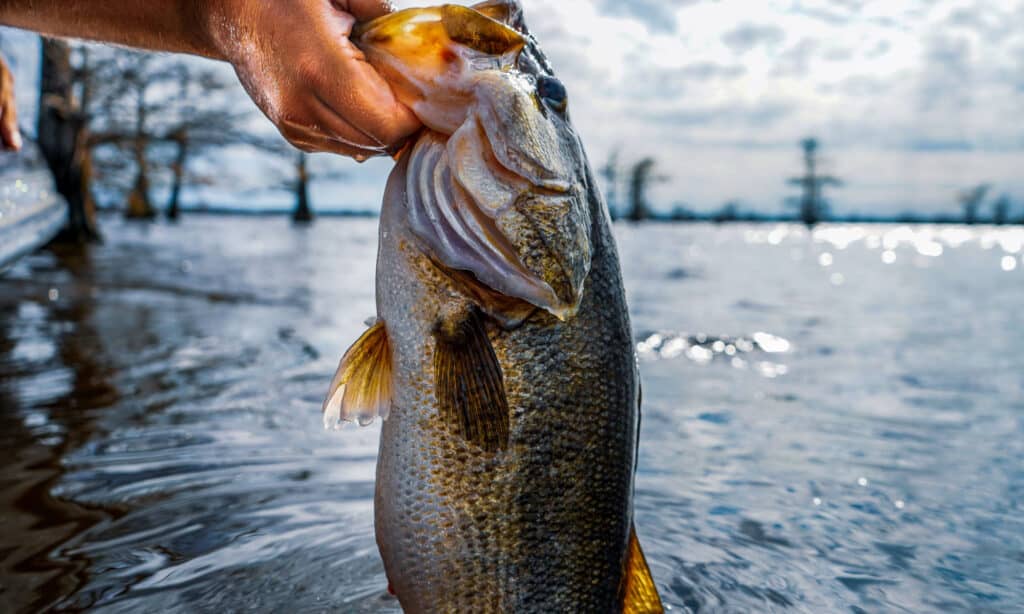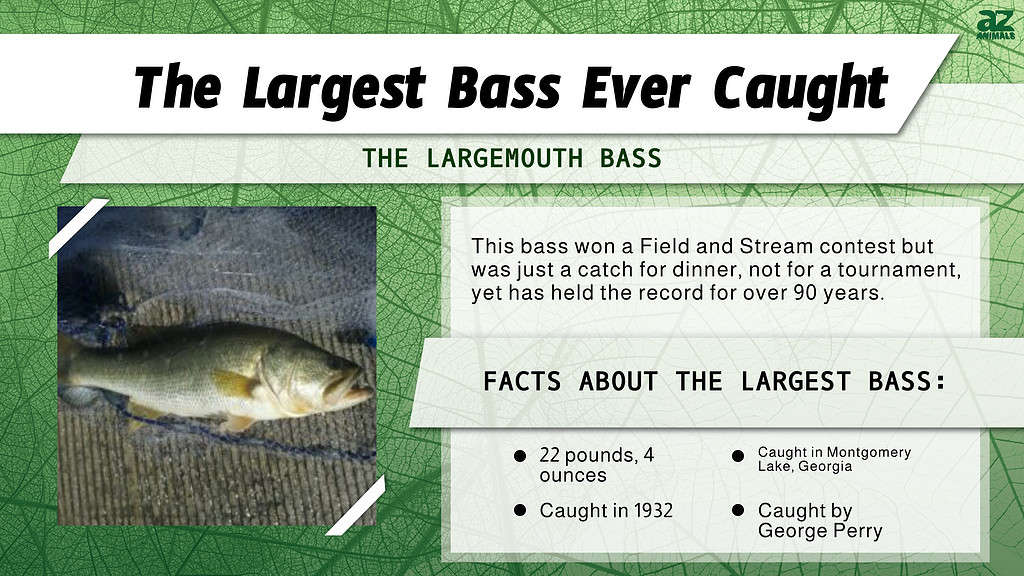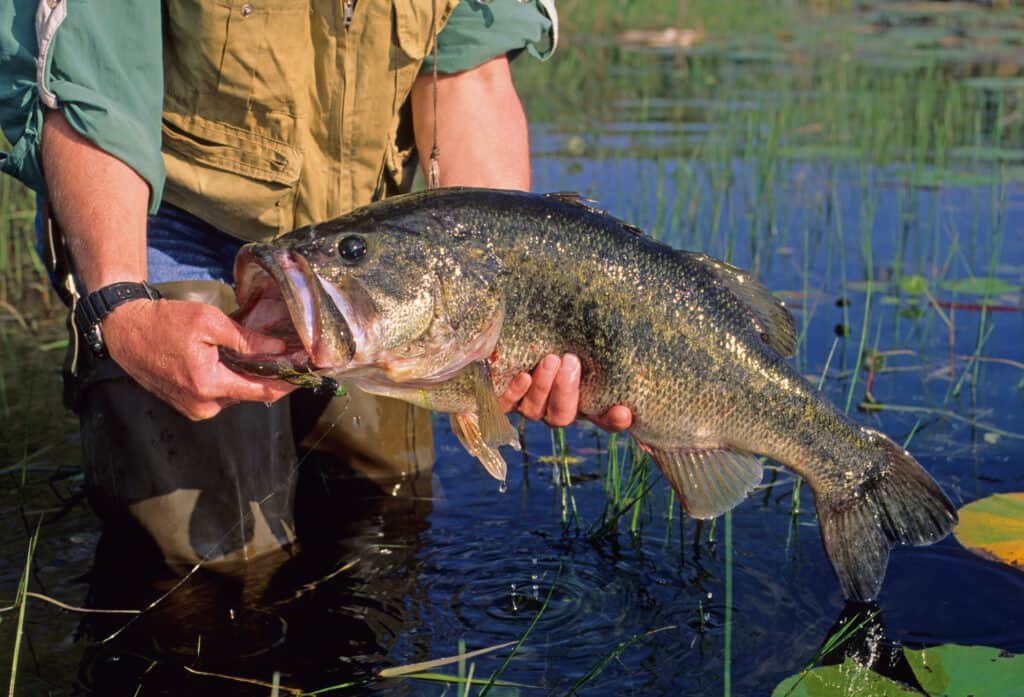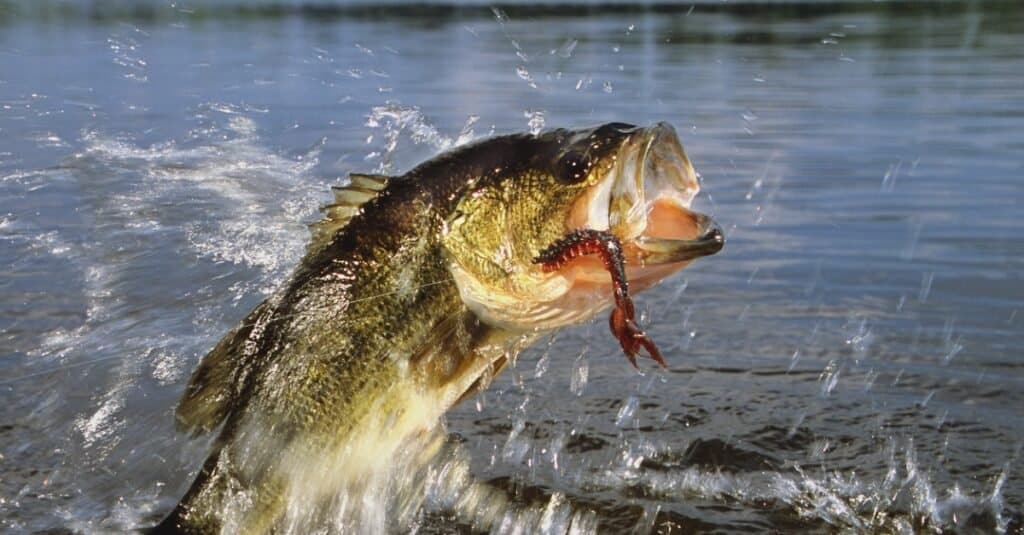While fishing is a popular pastime enjoyed by millions of people around the world, it’s also a sport that can be highly competitive. Anglers spend long hours on the water hoping to discover the largest bass ever caught. In their noble quest, many make great efforts to snag their prize fish.
So, you can imagine the excitement and awe of one fisherman after landing what whizzes believe to be the largest largemouth bass ever caught, achieving an incredible victory and honor.

The largest largemouth bass ever caught weighed 22 pounds, 4 ounces, a record held for over 90 years.
©Maclane Parker/Shutterstock.com
The Largest Bass
The bass is a fish that is native to North America. It is the largest of the sunfish family, with a body shape that is more like a perch than other basses. The largemouth bass has a wide mouth that goes past its eyes. They are usually greenish with dark bars or spots on their sides.
The largemouth bass can weigh up to 22 pounds and grow up to 29 inches long, but the average size is around 3 to 4 pounds. The largemouth bass is a popular game fish that anglers enjoy hunting worldwide.
Largemouth Bass Fishing
The largemouth bass is the most enticing game fish in the U.S. They are known for their fighting spirit and can put up quite a struggle when hooked. Despite this, they are relatively easy to catch, making them an excellent choice for beginner and seasoned anglers.
The largemouth bass is found in nearly every state in the U.S., so anglers have easy access to them no matter where they live. In most cases, you only need a rod and reel, some bait, and a little patience.
How To Catch Bass
While fishers or anglers can catch largemouth bass using various methods, live bait is usually the most effective. Worms, minnows, and crayfish are all excellent choices. Anglers who want to catch a largemouth bass out of season should use artificial lures such as spinnerbaits or crankbaits. This approach is especially beneficial when fish are not actively feeding.
When fishing for largemouth bass, it’s important to remember that they’re predatory. That means these fish are most active when there’s food around. This habit is also why it’s often best to fish for them in the spring and fall when they’re feeding heavily to prepare for winter or spawning.
The Largest Bass Ever Caught Was a Largemouth Bass

When it comes to largemouth bass, size does matter. George Perry is the world record holder for the largest bass caught in 1932. Perry bagged a largemouth bass in Montgomery Lake, an 880-acre reservoir in Georgia, U.S. His fish weighed 22 pounds and 4 ounces. But, what’s more impressive about this story is that George Perry was not even a competitive angler as we understand it today. He was just an ordinary guy wanting to catch a fish for dinner. Yet Perry’s fish has held the official world record for over 90 years.
The Story Behind the Largest Largemouth Bass Ever Caught
On June 2, 1932, George Perry and his friend went out on Montgomery Lake intending to catch some fish for dinner. Perry and his friend were using a creek chub fin tail shiner lure when they hooked into what would become the world-record largemouth bass. They fought the fish for a while before finally landing it. Then they took the fish to the local post office to weigh it before heading home for a tasty meal. Amazingly, the fish was enough to feed George and his family for several nights.
The crazy thing is that George’s fish might never have made it into the record books. Luckily, however, he heard about a big fish contest held by Field and Stream magazine at the time. So he entered the fish, and even though there was no photo to back up the claim, the measurements and weight of the fish were enough to win the contest. The prize was some clothing and a shotgun with shells, but the best part was that George Perry and his largemouth bass made the history books that day.
So, there you have it. The story of the largest largemouth bass ever caught. A 22-pound, 4-ounce fish was caught by George Perry in 1932 from Montgomery Lake in Georgia. A fish that almost didn’t make the record books but did, thanks to a big fish contest and some savvy angling on Perry’s part. A fish that, to this day, is still the world record holder for largemouth bass, and a fish that provides hope to anglers everywhere that, if George Perry can catch a world record fish, anyone can.

Largemouth bass can thrive in a wide range of temperatures and water conditions.
©iStock.com/stammphoto
Where is Montgomery Lake Located on a Map?
If you are looking for a detailed description of the location of Montgomery Lake in Georgia, then look no further. Located in the southeastern United States, Montgomery Lake can be found approximately 30 miles east of Atlanta, Georgia. To get there, take Interstate 20 East and exit onto Highway 138 towards Conyers. Continue on this road until you reach Flat Shoals Road, and turn right. From there, follow signs to the lake, which is located off Sinclair Circle.
On a map, Montgomery Lake can be pinpointed by searching for its coordinates at latitude 33.6057° N and longitude -83.7489° W. The lake itself spans over 500 acres, with surrounding forest land adding to its natural beauty.
So whether you’re an avid fisherman or just looking for some peace and quiet away from the hustle and bustle of city life, Montgomery Lake provides a serene retreat that’s easily accessible from Atlanta or any nearby town in Georgia.
Manabu Kurita of Japan Challenges the World Largemouth Bass Record

Largemouth bass is invasive in Japanese waters, so the government has been trying to exterminate them.
©iStock.com/stammphoto
While George Perry’s fish held the official world record for more than 80 years, a more recent report has challenged this world record. In 2009, Manabu Kurita of Japan landed a largemouth bass that weighed 22 pounds, 5 ounces, and measured 29 inches. Kurita caught this fish in Lake Biwa, Japan, using live bluegill as bait.
Kurita’s fish beats the weight of Perry’s fish by one ounce. However, the International Game Fish Association considers Kurita’s fish a tie with the previous record. For it to have surpassed the previous title, the bass would have had to outweigh Perry’s fish by more than 2 ounces. Regardless, Kurita’s bass is still an impressive catch.
Largemouth Bass in Japan
The largemouth bass is a non-native species in Japan, and the government has been trying to exterminate them for years. The primary reason is that the government considers largemouth bass a nuisance. They compete with native fish species for food, damaging the delicate ecosystem of ponds and lakes in Japan.
The Japanese government has been trying various methods to eliminate largemouth bass. Still, so far, nothing has been entirely successful. However, this lack of success ensures a significant number of these fish still swim in Japanese waters–enough to satisfy the fishing passion of anglers like Manabu Kurita and other bass fishing enthusiasts.
Where are Largemouth Bass Found?
The Largemouth Bass (Micropterus salmoides) is a freshwater fish species native to North America. It is a popular gamefish and is sought after by anglers for its fighting ability and size.
Largemouth Bass are typically found in freshwater habitats with clear water and an abundance of vegetation, such as weed beds, lily pads, and other types of underwater cover. They are also known to inhabit a variety of other freshwater environments, including rivers, lakes, ponds, and reservoirs.
In addition to its popularity as a sportfish, the Largemouth Bass is also commercially important, as it is widely farmed for food and for stocking recreational fishing waters. The species has also been introduced to other countries and has established populations in many parts of the world, including South America, Europe, Africa, and Asia.
Largemouth Bass are generally hardy and adaptable and are considered to be one of the most successful species of freshwater fish in terms of distribution and abundance. However, in some areas, overfishing, habitat degradation, and the introduction of non-native species can pose threats to their populations.
The photo featured at the top of this post is © iStock.com/stammphoto
Thank you for reading! Have some feedback for us? Contact the AZ Animals editorial team.







